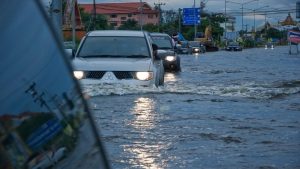So much attention has been paid to California’s long drought (somewhat alleviated in the past year) that many people have overlooked the flip side – certain parts of the state, including some communities in our service area, are vulnerable to flooding that can cause enormous property damage and even deaths. Flooding was catastrophic this winter up north, and memory still lingers of last winter’s watery road shutdowns closer to here.
California’s long drought (somewhat alleviated in the past year) that many people have overlooked the flip side – certain parts of the state, including some communities in our service area, are vulnerable to flooding that can cause enormous property damage and even deaths. Flooding was catastrophic this winter up north, and memory still lingers of last winter’s watery road shutdowns closer to here.
It doesn’t rain often in our region, but when it does it can really pour. The results can be devastating. Hard-packed desert land does not readily absorb large volumes of water; steep terrain can wash away or channel large volumes of water toward homes at lower elevations; debris clogging storm drains during a flash flood can cause overflows that threaten even homes not normally in a floodplain.
If you have experienced even minor flooding in the past – or think you might because of your location – here are some tips to help you cope with the danger.
- Regrade your property with a small earthen berm can help keep water away from your homes.
- Watertight closures over windows and doors can prevent flood waters from entering.
- Put furnaces, heat pumps, water heaters and other major appliances on elevated platforms at least six inches high.
- For best protection, call us about inspecting your property to see if backup valves and sewer relocation is viable.
Of course, some of these are very expensive precautions. Talk to your insurance agent about risk versus rewards, and see if you might be eligible for a premium reduction if you take expensive steps to guard against flooding.
Meantime, here are some good household precautions to take to protect your interests not only in case of flooding, but also from the threat of earthquakes or other natural disasters;
- Prepare a printed list of insurance policy numbers, vehicle titles, property deeds, wills, bank and credit card numbers, and keep a duplicate list in a location outside your home, such as at work, in a bank safe deposit box or at the home of a friend or relative. Be sure to include your insurance agent’s phone number handy. Printed copies are essential because a power outage may prevent you from accessing a computer or even from charging your phone.
- Keep an inventory of personal valuables that can be used to identify what has been lost or damaged. Photographs and/or a video of each room in your house can prove helpful.
- Learn where key water and gas shutoffs are located in your home and shut them off in the event of a flood or other natural disaster. (If they haven’t done so already, ask our service technician to install valve tags on water and gas lines in your home.)
- If you do experience property damage from a flood or any other disaster, be cautious when inspecting. Turn off all utilities at the main power switch or valve. Be alert for gas leaks, and inspect with a flashlight rather than candle or lantern.
- Do not touch any electrical equipment after a flood until you are certain all power is off.
- Don’t walk in flood waters, which may be contaminated and cause severe health threats.
Finally, be thankful we live in a region with plentiful sunshine and mild weather some 300+ days of the year. Enjoy it while you prepare for the worst.
